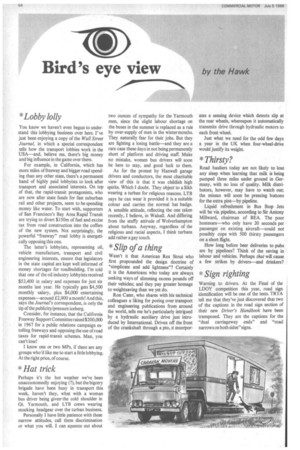Bird's eye view
Page 66

If you've noticed an error in this article please click here to report it so we can fix it.
*Lobby lolly You know we haven't even begun to understand this lobbying business over here. I've just been enjoying a copy of the Wall Street Journal, in which a special correspondent tells how the transport lobbies work in the USA—and, believe me, there's big money and big influence in the game over there.
For example, in California, which has more miles of freeway and bigger road spending than any other state, there's a permanent band of highly paid lobbyists to look after transport and associated interests. On top of that, the rapid-transit protagonists, who are now after state funds for fast suburban rail and other projects, seem to be spending money like water. To start with, supporters of San Francisco's Bay Area Rapid Transit are trying to divert $150m of fuel and excise tax from road construction into the coffers of the new system. Not surprisingly, the powerful "freeway" road lobby is energetically opposing this one.
The latter's lobbyists, representing oil, vehicle manufacture, transport and civil engineering interests, ensure that legislators in the state capital are kept well informed of money shortages for roadbuilding. I'm told that one of the oil industry lobbyists received
$53,400 in salary and expenses for just six months last year. He typically gets $4,500 monthly salary, plus $4,000 entertaining expenses—around £2,900 a month! And this, says the Journal's correspondent, is only the tip of the publicity/pressure iceberg.
Consider, for instance, that the California Freeway Support Committee raised $200,000 in 1967 for a public relations campaign extolling freeways and opposing the use of road taxes for rapid-transit schemes. Man, you can't lose !
I know one or two MPs, if there are any groups who'd like me to start a little lobbying. At the right price, of course.
* Hat trick
Perhaps it's the hot weather we've been unaccustomedly enjoying (?), but the bigotry brigade have been busy in transport this week, haven't they, what with a woman bus driver being given, the cold shoulder in Gt. Yarmouth, and LTB crews wearing mocking headgear over the turban business.
Personally I have little patience with these narrow attitudes, call them discrimination or what you will. I can squeeze out about two ounces of sympathy for the Yarmouth men, since the slight labour shortage on the buses in the summer is replaced as a rule by over-supply of men in the winter months. They naturally fear for their jobs. But they are fighting a losing battle—and they are a rare case these days in not being permanently short of platform and driving staff. Make no mistake, women bus drivers will soon be here to stay, and good luck to them.
As for the protest by Hanwell garage drivers and conductors, the most charitable view of this is that it was childish high spirits. Which I doubt. They object to a Sikh wearing a turban for religious reasons. LTB says he can wear it provided it is a suitable colour and carries the normal hat badge. A sensible attitude, reflecting the one taken recently, I believe, in Walsall. And differing from the stuffy attitude of Wolverhampton about turbans. Anyway, regardless of the religious and racial aspects, I think turbans add rather a gay touch.
* Slip of a thing
Wasn't it that American Rex Stout who first propounded the design doctrine of "simplicate and add lightness"? Certainly it is the Americans who today are always seeking ways of slimming excess pounds off their vehicles; and they pay greater homage to weightsaving than we yet do.
Ron Cater, who shares with his technical colleagues a lilting for poring over transport and engineering publications from around the world, tells me he's particularly intrigued by a hydraulic auxiliary drive just introduced by International. Driven off the front of the crankshaft through a pto, it incorpor
ates a sensing device which detects slip at the rear wheels, whereupon it automatically transmits drive through hydraulic motors to each front wheel.
Just what we need for the odd few days a year in the UK when four-wheel-drive would justify its weight.
* Thirsty?
Road hauliers today are not likely to lose any sleep when learning that milk is being pumped three miles under ground in Germany, with no loss of quality. Milk distributors, however, may have to watch out; the missus will soon be pressing buttons for the extra pint—by pipeline.
Liquid refreshment in Bus Stop Jets will be via pipeline, according to Sir Antony Millward, chairman of BEA. The poor hostesses—who only have 20 seconds per passenger on existing aircraft—could not possibly cope with 500 thirsty passengers on a short flight.
How long before beer deliveries to pubs are by pipelines? Think of the saving in labour and vehicles. Perhaps that will cause a few strikes by drivers—and drinkers?
* Sign righting
Warning to drivers. At the Final of the LDOY competition this year, road sign identification will be one of the tests. TRTA tell me that they've just discovered that two of the captions in the road sign section of their new Driver's Handbook have been transposed. They are the captions for the "dual carriageway ends" and "road narrows on both sides" signs.
























































































































































